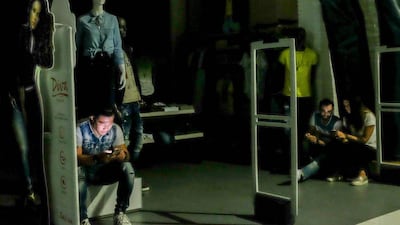On July 31, 2012, the biggest power cut in history took place in India, affecting more than 620 million people, half of the country’s population.
Thankfully, it lasted for just a day, but what a day it must have been, given it was in the middle of a very hot summer: people trapped in lifts, hospitals scrambling to find alternate power sources for life support machines, chaos on the streets and so forth.
From natural disasters to man- made catastrophes, the reasons for total blackouts are diverse and remind us how fragile and dependent we all are on power.
All of this came to mind when, on Monday, a power cut at the Dubai Mall became big news.
Fortunately for most people these days, their brightly lit smartphones allowed them to keep on walking inside the mall instead of sitting in the dark.
We rarely know what we have until it is gone and for about 90 minutes everything was on hold, and I can imagine those were the longest ever minutes for some of those shoppers.
One of my worst nightmares is getting stuck inside a skyscraper’s lift, as a powerpower cut happened once while I was inside a decrepit old building’s lift. The experience left me shaken.
It wasn’t the actual lift that bothered me, it was the annoying characters I ended up having to spend more than six hours with.
Taking a step back, we must reflect on how lucky we really are to have regular access to reliable electricity.
Satellite and aerial images show how extremely well lit this region is, with the exception of parts of the desert and areas that are in a constant state of conflict. One of the first places that gets bombed in war zones are the power stations, so there is no surprise there.
At the same time, there are people who have never had any access to electricity.
According to The World Energy Outlook, in 2016 there were an estimated 1.2 billion people – 16 per cent of the global population – who did not have access to electricity. Many more suffer from supply that is of poor quality.
The report found that more than 95 per cent of those living without electricity are in countries in Sub-Saharan Africa and developing Asia, and they are predominantly in rural areas.
Energy poverty prevents economic growth and limits access to modern facilities and services, and is often associated with lack of access to reliable and clean running water.
So while some have unreliable access to power, many in the UAE waste energy by doing careless things like leaving lights and air conditioning on in too many rooms in their homes. But with the rising cost of utility bills nowadays, this is pushing them to be more careful.
For this year’s Earth Hour, Dubai achieved a remarkable reduction of carbon emissions and energy use, where the Dubai Electricity and Water Authority recorded a decrease of 244MW in energy use, compared to a 22MW reduction in the previous year. This resulted in offsetting 107 tonnes of carbon emissions, compared to 11 tonnes last year. Every bit helps.
Many of us may dream of those simpler days living in a tent in the desert, but after a while, without that light to read a book under, or that electric toothbrush and air conditioning, the magic of electricity will be sorely missed and let there be light will hold a different meaning.
rghazal@thenational.ae
On Twitter:@arabianmau

